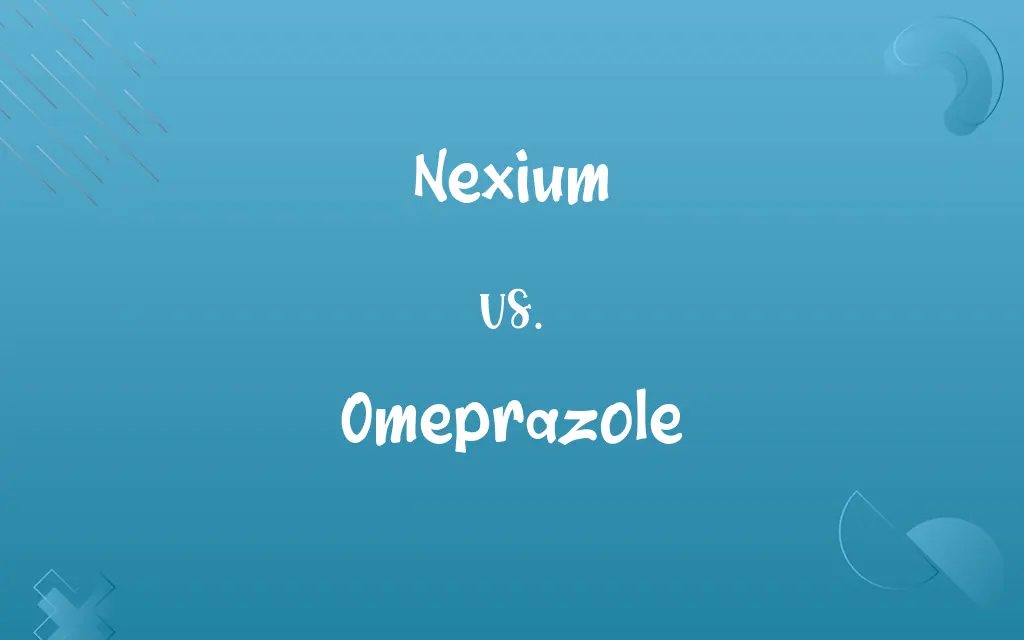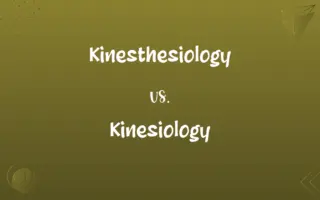Nexium vs. Omeprazole: Know the Difference

By Shumaila Saeed & Hifza Nasir || Published on March 14, 2024
Nexium (esomeprazole) and Omeprazole are proton pump inhibitors (PPIs) used to treat acid-related stomach issues, with Nexium being a newer, more targeted form of molecule, potentially offering improved acid control.

Key Differences
Nexium (esomeprazole) and Omeprazole are both used to reduce stomach acid, treating conditions like GERD, ulcers, and Zollinger-Ellison syndrome.
Hifza Nasir
Mar 14, 2024
Nexium is an S-enantiomer of omeprazole, which may result in more efficient acid control for some patients. Omeprazole, the older of the two, is available as a generic, making it often more cost-effective than Nexium. Both medications are effective in reducing acid production, but individual responses can vary, influencing a doctor's recommendation.
Shumaila Saeed
Mar 14, 2024
The side effects of Nexium and Omeprazole are similar, including risks like headache, nausea, and potential long-term effects such as vitamin B12 deficiency or bone fractures. However, the choice between them may consider the patient's response to treatment and side effect profile.
Shumaila Saeed
Mar 14, 2024
Both drugs are taken orally and can be found in over-the-counter (OTC) versions, Nexium is sometimes perceived as more effective due to its targeted mechanism. However, studies comparing their effectiveness show that the differences for many patients are minimal.
Shumaila Saeed
Mar 14, 2024
The decision to use Nexium over Omeprazole often comes down to clinical judgment, patient response, and cost considerations. Both medications require careful management when used long-term, including monitoring for adverse effects and ensuring they are used at the lowest effective dose for the shortest duration necessary.
Hifza Nasir
Mar 14, 2024
ADVERTISEMENT
Comparison Chart
Efficiency
Potentially more efficient acid control
Effective in reducing stomach acid
Shumaila Saeed
Mar 14, 2024
Side Effects
Headache, nausea, risk of long-term effects
Similar side effect profile
Shumaila Saeed
Mar 14, 2024
ADVERTISEMENT
Nexium and Omeprazole Definitions
Nexium
A proton pump inhibitor used for acid reflux treatment.
Nexium is prescribed for chronic GERD symptoms.
Hifza Nasir
Feb 27, 2024
Omeprazole
A widely used proton pump inhibitor.
Omeprazole is commonly prescribed for peptic ulcers.
Shumaila Saeed
Feb 27, 2024
Nexium
Offers targeted acid control.
Doctors might prefer Nexium for patients not responding well to other PPIs.
Hifza Nasir
Feb 27, 2024
Omeprazole
Side effects include nausea and headache.
Users may experience nausea when starting omeprazole.
Shumaila Saeed
Feb 27, 2024
Nexium
More expensive than its counterparts.
Nexium may cost more due to its branding and formulation.
Shumaila Saeed
Feb 27, 2024
ADVERTISEMENT
Omeprazole
Generic versions are available.
Generic omeprazole offers a cost-effective option for acid control.
Hifza Nasir
Feb 27, 2024
Nexium
Available in prescription and OTC forms.
Nexium 24HR is available over the counter for heartburn relief.
Shumaila Saeed
Feb 27, 2024
Omeprazole
Treats a variety of acid-related conditions.
Omeprazole is effective against Zollinger-Ellison syndrome.
Shumaila Saeed
Feb 27, 2024
Nexium
Can lead to side effects like headache.
Some Nexium users report headaches as a side effect.
Hifza Nasir
Feb 27, 2024
Omeprazole
Available over the counter for heartburn relief.
OTC omeprazole can be used for occasional heartburn.
Hifza Nasir
Feb 27, 2024
Omeprazole
A proton pump inhibitor drug, C17H19N3O3S, that suppresses gastric acid secretion and is used for the treatment of duodenal and gastric ulcers and gastroesophageal reflux disease.
Shumaila Saeed
Jan 25, 2024
Repeatedly Asked Queries
Is Nexium more effective than Omeprazole?
Nexium may offer more efficient acid control for some patients, but overall effectiveness can be similar.
Shumaila Saeed
Mar 14, 2024
Can either medication cause kidney problems?
Long-term use of PPIs, including Nexium and Omeprazole, has been associated with an increased risk of kidney issues, underscoring the importance of medical supervision.
Dua Fatima
Mar 14, 2024
Can Nexium and Omeprazole be taken together?
No, taking them together is unnecessary and could increase the risk of side effects since they work in the same way.
Shumaila Saeed
Mar 14, 2024
Are Nexium and Omeprazole safe for long-term use?
They can be used long-term under medical supervision, but potential risks require monitoring for adverse effects.
Hifza Nasir
Mar 14, 2024
What are the main differences in side effects between Nexium and Omeprazole?
The side effect profiles are similar, including risks like headache, digestive issues, and long-term risks such as bone fractures or vitamin deficiencies.
Dua Fatima
Mar 14, 2024
Are there people who should not take Nexium or Omeprazole?
Individuals with certain medical conditions or those taking specific medications that could interact with PPIs should avoid them, requiring consultation with a healthcare provider.
Hifza Nasir
Mar 14, 2024
How do Nexium and Omeprazole work?
Both medications work by blocking the proton pump in stomach cells, reducing acid production.
Hifza Nasir
Mar 14, 2024
Why might a doctor prescribe Nexium over Omeprazole?
A doctor might choose Nexium for its potentially more targeted action or based on a patient's response to treatment.
Shumaila Saeed
Mar 14, 2024
How long does it take for Nexium and Omeprazole to work?
Both medications may start reducing stomach acid within a few hours, but full effects on symptoms may take 1-4 days.
Shumaila Saeed
Mar 14, 2024
Can the use of Nexium or Omeprazole lead to vitamin deficiencies?
Yes, long-term use can lead to deficiencies in vitamins such as B12 and minerals like magnesium, due to reduced stomach acid affecting nutrient absorption.
Dua Fatima
Mar 14, 2024
Share this page
Link for your blog / website
HTML
Link to share via messenger
About Author
Written by
Shumaila SaeedShumaila Saeed, an expert content creator with 6 years of experience, specializes in distilling complex topics into easily digestible comparisons, shining a light on the nuances that both inform and educate readers with clarity and accuracy.
Co-written by
Hifza Nasir







































































